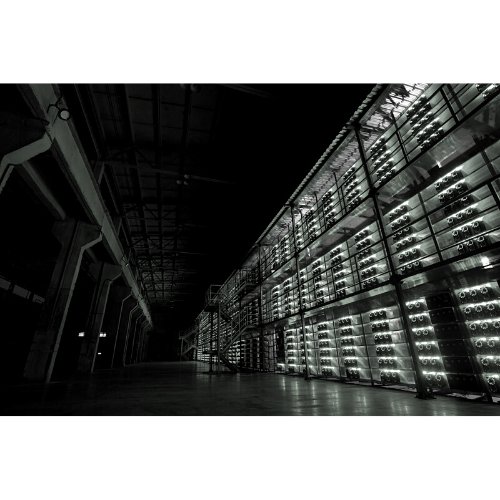| A cryptocurrency mine is a place where cryptocurrencies are “mined“ |
Bitcoin surpassed the market capitalization of $1 trillion in 2021 and has since had numerous flattuations. This has inspired many companies and startups in starting mining activities and expanding very rapidly. The ban on mining in China has caused a mass exodus and some “miners” are moving mining facilities to the United States.
What is mining?
Cryptocurrency mining is the process of validating cryptocurrency transactions and adding these transactions to the public ledger called the blockchain. In return for this work, miners receive a reward in the form of new cryptocurrencies.
How does mining work?
Cryptocurrency mining requires a computer and a special program, which miners use to solve complex mathematical problems. Solving these problems is critical to network security because it prevents fraudulent use of the same coins multiple times, called double spending. When a miner solves the problem, it “locks” a group of transactions, or “block,” into the blockchain.
What is the reward for mining?
The reward for mining is twofold. First, when a miner solves a block, he or she receives new cryptocurrencies. In addition, miners are paid with transaction fees that users pay when they send cryptocurrencies. These rewards act as an incentive for miners to continue their work.
What is a cryptocurrency mine?
A cryptocurrency mine is a place where cryptocurrencies are mined, or produced, using specialized hardware and software. Mining is the process by which new cryptocurrencies are created and transactions are verified and added to the public ledger, known as the blockchain. Miners use powerful computers to solve complex mathematical equations and, when they successfully verify a block of transactions, are rewarded with a number of cryptocurrencies. Mining requires considerable computing power and energy and has become increasingly competitive. As a result, many mines are located in areas where electricity is cheap and abundant, such as China and Iceland.
Is mining profitable?
Cryptocurrency mining can be profitable, but it depends on several factors. First, the cost of mining hardware and electricity can be high. Also, the difficulty of the math problem to be solved increases as more people join the network, making it harder to get a reward. Finally, the value of the cryptocurrencies themselves can be extremely volatile, so there is always a risk that the value of the coins you are mining could drop.
Pros and Cons of Mining
In general, whether or not mining is a good idea depends on individual circumstances and factors such as the cost of electricity and the availability of specialized hardware.
| Pros of Cryptocurrency Mining | Cons of Cryptocurrency Mining |
|---|---|
| Potential Gain: Miners are rewarded with new cryptocurrencies and transaction fees. | High Cost: Specialized mining hardware and electricity needed can be expensive. |
| Network Participation: Mining supports the cryptocurrency network, helping to validate and record transactions. | Technical Difficulty: Mining requires a good understanding of how cryptocurrencies and the blockchain work. |
| Decentralization: Theoretically, anyone can become a miner, contributing to the decentralization of the network. | Centralization of mining: In practice, large-scale mining has become increasingly centralized, with large players dominating the market. |
| Possibility of Appreciation: If the value of cryptocurrency increases, miners can benefit greatly. | Market Volatility: The value of cryptocurrencies can be extremely volatile, which can make mining less profitable. |
| Limited Supply: Some cryptocurrencies, such as Bitcoin, have a limited maximum supply, which may increase their value over time. | Energy Consumption: Cryptocurrency mining requires a large amount of energy, which has raised environmental concerns. |
| Technological Innovation: Mining drives innovation in specialized hardware and software. | Regulation and Legality: Regulation of cryptocurrency mining varies widely from country to country, creating legal uncertainties. |
The largest Bitcoin mine in the United States
Rockland, Texas, is home to the largest Bitcoin “mine” in North America. Operated by Whinstone U.S. this mining facility may be the first of many.
Criticalities of cryptocurrency mining
Mining, while fascinating, presents a number of challenges and unresolved issues. Here are some of the main points of discussion.
High Energy Consumption
Cryptocurrency mining, particularly Bitcoin, requires an enormous amount of energy. Specialized mining hardware must perform complex calculations, and this activity requires a large amount of electricity. This high energy consumption has a significant impact on the environment and has raised concerns about the sustainability of cryptocurrency mining.
Centralization of Mining
Despite the original intent of cryptocurrency decentralization, cryptocurrency mining has become increasingly centralized. This is because large-scale mining operations can afford more powerful and expensive hardware, which means they are more likely to solve the mathematical problems required to add a new block to the blockchain and then receive the reward. This centralization can undermine the democratization goal behind cryptocurrencies.
Volatility of Cryptocurrencies
The value of cryptocurrencies is notoriously volatile. This volatility can have a significant impact on the profitability of mining. If the value of a cryptocurrency drops significantly, miners can find themselves operating at a loss.
Restricted Access to Mining Hardware
Cryptocurrency mining requires the use of specialized hardware, which can be expensive and difficult to obtain. This limits the accessibility of mining to a small group of people and companies, counteracting the idea of an open system accessible to all.
Regulation and Legality
Regulation of cryptocurrency mining varies greatly from country to country. In some places, cryptocurrency mining is illegal, while in others it is heavily regulated. These legal uncertainties can pose a significant challenge for anyone interested in cryptocurrency mining.
In conclusion, although cryptocurrency mining offers potential rewards, it also presents a number of significant challenges. These critical issues must be addressed carefully by anyone considering entering the mining industry. Remember, as always, to do your research and carefully weigh the risks before you get started.
What do you think about the problems and critical issues in cryptocurrency mining? Share your opinion in the comments below!
